David Dubrow's Blog
September 27, 2023
Update, September 2023
Hi! It’s been some time since I last updated the blog.
I’m still writing. Every day I put words on the page. It’s slow going. I wish I could write faster.
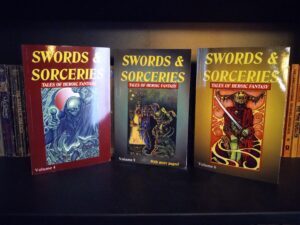 My most recent story, Gods, Men, and Nephilim, was published in the anthology Swords and Sorceries: Tales of Heroic Fantasy Volume 6.
My most recent story, Gods, Men, and Nephilim, was published in the anthology Swords and Sorceries: Tales of Heroic Fantasy Volume 6.
Prior to that, my story The Mistress of the Marsh was published in the anthology Swords and Sorceries: Tales of Heroic Fantasy Volume 5.
Clever readers will notice a trend. I’m turning these and other unpublished stories into the chapters of a novel taking place in a fantasy version of ancient Rome. A straightforward swords and sorcery tale, something fun to read.
Still, it’s been a few years since I produced a work of any length. My last novel, The Holy Warrior and the Last Angel, was published in 2018. Five years is a long time between books, and my current work won’t be ready for publication until at least 2024.
So what happened?
The easy answer is that Covid happened. I didn’t get terribly sick, but the lockdowns and associated insanity ate up a good bit of my time and attention.
When my son’s school went digital at the beginning of the lockdowns it fell to me to be his schoolteacher. I made sure he did his elementary school assignments, added extra reading, and took him places throughout the day to get him out of the house. We didn’t lock down. We went to parks and nature preserves and playgrounds every single day, because it would be destructive and stupid to keep a growing, healthy child indoors all day over a disease that had an effectively zero percent chance to kill him or even make him seriously ill.
The Covid lockdowns were my chance to shine as a man who ranks high on the Disagreeability Scale. When everyone was complaining about weight gain (the Covid 19), I adopted a system of fasting and weightlifting that I still use today. When our leaders suggested we stay inside to keep from getting sick, I went outside to get fresh air and sunlight. When Doordash and Uber Eats became the way to eat, we had more and more home-cooked meals. In the end, the pandemic did wonders for my family’s health, and my son’s reading/language skills raised significantly.
Even so, the time spent being my son’s teacher, while a great experience, pretty much killed my writing for months. By March of 2020, when the state instituted lockdowns, I’d written the first draft of one novel and was about a quarter of the way through the sequel when I had to stop writing until June. This was a good thing: the books weren’t good. Jealous of writers who could crank out a novel once every two months, I had been trying to emulate that success in both speed and marketability, rather than writing good books. Much of it was crap, as I learned upon a good long review of the first draft. It’s salvageable, and I want to get back to it some day, but by the time I was able to sit back down at the writing desk, I had lost faith in the project. (Superheroes. A novel series about superheroes. I know. It’s still a cool concept, what I worked out.)
I got about halfway through my next project, which was a space opera about First Contact with intelligent alien life, before I needed a break. I had a decent outline and knew where I wanted it to go, but I was concerned that the format might be too close to my first novel series, which was complex, bordering on complicated. Too many characters, too much going on. Some day I want to pick that back up, too.
The break I took was to write a swords and sorcery story; I’d found an advertisement from Parallel Universe Publications looking for stories in that genre, and it’s something I’d always wanted to dip into. The success of that story, The Green Wood, spurred me to write more in that setting, leading me to today.
There it is. A peek under the hood. It takes me longer to write not because I’m so great, but because it just takes me longer to write. My friend Joe Hirsch has a much higher output, and he’s one of the best writers I know.
So, I’m still here. Still at it.
Thank you for reading, as always.






June 13, 2022
Swords and Sorceries Volume 4
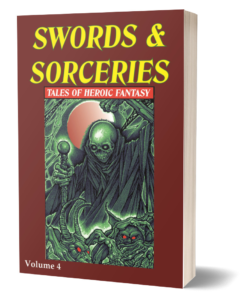 My short story The Green Wood is featured in the new anthology Swords & Sorceries: Tales of Heroic Fantasy Volume 4.
My short story The Green Wood is featured in the new anthology Swords & Sorceries: Tales of Heroic Fantasy Volume 4.
Set in a fantasy version of ancient Rome, The Green Wood is an old-school swords-and-sorcery tale filled with action, intrigue, and black magic. It’s a real honor to have my name alongside tremendous talents like Adrian Cole, whose short story collection Tough Guys was one of my all-time favorite reads.
Here’s an excerpt of The Green Wood:
Grimacing at the ache in his shoulder, a pain so fierce that he feared a plague quill had pierced his lorica armor, Lior swung his spatha in a downward cut. The long, broad-bladed sword splintered the shaft of the pike that thrust at his side, and the dirt-grimed pikeman took the edge across his jaw, severing it. Shrieking, adding to the battle din, the man staggered back, clutching the crimson ruin of his face. Lior spurred his horse to trample him into the mire of blood and dirt.
Sweat streamed into Lior’s eyes, narrowed to slits against the glare of the sun. Byzantium’s 9th Cohort had struggled and strained and fought for every yard of earth since dawn, and now, at long last, he spied the crest of the hill past ranks of armored Gauls. If Byzantium reached the high ground, the battle would be all but won.
Renewed by the possibility of victory, Lior flicked the reins to charge forward. His exhausted horse reared, and its iron-shod hooves shattered the skulls of the enemy on its way down.
“Sticking our necks out a bit, aren’t we, sir?” shouted a voice behind him.
Lior grinned. “Perhaps a hair.”
Optio Albian rode up to his left. Not as tall as Lior, but twice as broad, with skin the color of brick and a jaw that jutted aggressively past his helm’s cheek-guards. “We’re too far ahead!”
“They’ll catch up!” Panting, Lior leaned cross-body to drive his sword’s point into the upper chest of a pikeman fumbling after a missed thrust.
“D’you see anyone else?” Albian hacked arms and heads with the workmanlike chops of a butcher. His entire right side was bathed in dust-caked blood from shoulder to sandal, and the horse beneath him rolled its battle-mad eyes, barely controlled by the pressure of his knees.
“When we reach the hilltop they’ll flock to us.”
“Not if we—“ Albian paused. “DOWN!”
Without hesitation, Lior threw himself forward, along the neck of his horse.
For the rest of the story, click here to get a copy of Swords & Sorceries: Tales of Heroic Fantasy Volume 4.






December 20, 2021
Top Ten Books of 2021
When you decide that you’re going to write books, no matter what kind, the decision irrevocably changes how you read. Writers read for pleasure like everyone else, but they also analyze what they read, determining what works from what doesn’t and why.
I do that, at least.
The best fiction makes you forget that you’re in the act of reading; the best non-fiction turns you into an engaged student (or activist).
What follows is a list of which books made the greatest impression on me over the last twelve months. Lists like this tend to be quite personal. I’ll leave it up to the reader to suss out what makes me tick. I already know.
—
10. The Three-Body Problem by Cixin Liu. The first in a sci-fi trilogy, it’s a taut, imaginative trip into near-future technology, extraterrestrial intelligence, and recent Chinese history, viewed through a purely materialistic lens. There’s nothing spiritual or aspirational about it, making it the Hugo-winning apotheosis of 21st century science fiction, which tends to explore nihilism over grace. Books two and three (The Dark Forest and Death’s End, respectively) got progressively less interesting, and the physics, as it advanced, became more like magic than science (A.C. Clarke, call your agent). If you read Three-Body, you’ll have to read the other two. You should read Three-Body anyway.
 9. Grendel by John Gardner. The story of Beowulf as told by the monster, it’s a novel to be both enjoyed and admired. Clever, funny, gory, literary, and thoughtful, you only need to read the first page to understand why it’s a classic piece of literature. Gardner was a brilliant writer who died way too soon.
9. Grendel by John Gardner. The story of Beowulf as told by the monster, it’s a novel to be both enjoyed and admired. Clever, funny, gory, literary, and thoughtful, you only need to read the first page to understand why it’s a classic piece of literature. Gardner was a brilliant writer who died way too soon.
8. Wilderness of Mirrors by David C Martin. The non-fiction story of two men, William King Harvey and James Jesus Angleton, who worked for the CIA; Harvey was instrumental in exposing Soviet spy Kim Philby (who was in England’s MI-6), and Angleton had known Philby for years without suspecting a thing. Both Harvey and Angleton were complete loons in their own way, and if you ever thought that America’s clandestine intelligence service was anything other than accidentally competent, this book will disabuse you of that notion.
7. Couples by John Updike. I first read this novel in the mid-1990s, after finishing Updike’s Rabbit tetralogy, so I thought I would give it another spin. The themes of love, infidelity, and yearning remain relevant decades after the book was written. His graphic depictions of sex (especially in the 1960s) and frank discussions of intimacy are likewise shocking; Updike does not leave anything unsaid (one critic once said of him, “Did this guy ever have a thought he didn’t put on paper?”). I take it that the novel is at least a little bit autobiographical; I’m just glad I wasn’t Updike’s neighbor back then. This is still my favorite book of his.
6. Neighbors by Thomas Berger. Another novel of suburbia (after Updike’s Couples). Earl Kreese, a staid, boring, regular guy finds himself dealing with a pair of crazies who have just moved in next door. The absurdity in this novel borders on the surreal, but it’s hysterically funny for both the new neighbors’ antics and Earl’s reaction to them. Among many other excellent novels, Berger wrote Little Big Man.
5. Kafka on the Shore by Haruki Murakami. This was my first Murakami novel, and remains my favorite. Bizarre, filled with magical realism, ghost sex, and questions of identity and grief, it keeps you interested, even throughout the frequent descriptions of the protagonist’s mundane doings when not encountering weird phenomena. Since Kafka I’ve read several other Murakami books, which range from the tedious (1Q84) to the fascinating (A Wild Sheep Chase). Murakami is a writer who most people either love or don’t. I liked a good bit of what I’ve read, and didn’t like other bits.
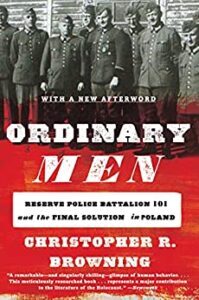 4. Ordinary Men by Christopher R. Browning. If you’ve ever wondered how average Germans could murder so many Jewish men, women, and children in Poland during WWII, this is your book. A nonfiction work of horror, once you read it you’ll never forget it. I disagree with the writer’s conclusions, which take at least some of the individual responsibility away from the murderers, but this is still a vital text. Graphic and brutal.
4. Ordinary Men by Christopher R. Browning. If you’ve ever wondered how average Germans could murder so many Jewish men, women, and children in Poland during WWII, this is your book. A nonfiction work of horror, once you read it you’ll never forget it. I disagree with the writer’s conclusions, which take at least some of the individual responsibility away from the murderers, but this is still a vital text. Graphic and brutal.
3. H.P. Lovecraft: Against the World, Against Life by Michel Houellebecq. I’ve been an avid reader of Lovecraft and his associates since my teenage years, and Houellebecq’s analysis of the man and his mythos puts them in a new light, making them shine again. What an amazing book. I also enjoyed Houellebecq’s novels Serotonin and Submission in 2021, and highly recommend them.
2. The Obesity Code by Dr. Jason Fung. A guide to intermittent fasting: why it works and how you can make it work for you. Fasting has helped me immensely since I started it (I read Fung’s book in one night and began fasting that next morning). I look and feel better every day. Life-changing.
1. The Complete Stories by Flannery O’Connor. I couldn’t stand O’Connor’s novels Wise Blood and The Violent Bear It Away, but as a short story writer there was no one better in American literature. She shocks, she elevates, she hits you in the gut, sometimes in the same story. It’s an anthology I can’t wait to read again. The best book I read in 2021, and several of the previous years, also. Absolutely brilliant.
—
I’m interested to see what 2022’s top ten are going to be. 2021 will be hard to beat!






October 6, 2021
Squid Game and Other South Korean Diversions
Few things in life are more enjoyable than sharing one’s interests. So it’s awesome that the South Korean show Squid Game has become such a big thing. Since eschewing Hollywood as a source of entertainment I’ve had to go further afield for screen entertainment, and South Korean dramas more than fill the gap.
Some time ago I wrote a roundup of some of my favorite K-dramas for the site Hollywood in Toto, and I’ve discussed other shows here. In light of Squid Game becoming Netflix’s top streamed show at the time of this writing, I wanted to do a brief review and recommend other shows connected to Squid Game. You know, like tentacles from a squid’s body.
Who doesn’t like calamari?
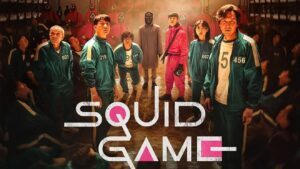 Squid Game: The Death Game subgenre of horror benefits greatly from this K-drama treatment, with its heavy focus on plot and character development. The genre doesn’t work if you don’t care at least a little bit about the characters, and the K-drama format excels at making even the antagonists sympathetic. Squid Game does a great job of keeping you watching episode by episode, building dread, and even if there aren’t a lot of surprises, you can’t turn away. Extremely gory, with an unnecessary sex scene for the American Netflix audience, it entertains throughout. Just don’t expect a fully satisfying ending.
Squid Game: The Death Game subgenre of horror benefits greatly from this K-drama treatment, with its heavy focus on plot and character development. The genre doesn’t work if you don’t care at least a little bit about the characters, and the K-drama format excels at making even the antagonists sympathetic. Squid Game does a great job of keeping you watching episode by episode, building dread, and even if there aren’t a lot of surprises, you can’t turn away. Extremely gory, with an unnecessary sex scene for the American Netflix audience, it entertains throughout. Just don’t expect a fully satisfying ending.
Lee Jung-jae, the male lead of Squid Game, starred in a terrific show called Chief of Staff. Here he plays the polar opposite of the scummy character from Squid Game: a refined, educated chief of staff to a particularly disgusting lawmaker. A lot comes together in this show: politics, the press, espionage, and class distinctions. If you’re not familiar with South Korea’s politics (I’m not), some of it can be a bit confusing at first, but the emphasis on personal relationships, character, and ethics makes it a gripping watch. Two seasons, ten episodes each. Definitely worth your time if you dig high intrigue and politicking.
 Wi Ja-hoon, who played the cop in Squid Game, starred in Something in the Rain, a romantic drama in which he played the female lead’s younger brother. Something in the Rain tells the story of an older woman (early 40’s) who gets romantically involved with her younger brother’s best friend, and the complications that arise from it. Themes of socioeconomic class, family responsibility, and social pressure take center stage. There’s a subplot about workplace sexual harassment that kind of goes nowhere, and the middle-to-end of the 16 episode-long story drags until it runs out of ideas. I kind of liked it, I watched all of it, and I wish it had a better conclusion.
Wi Ja-hoon, who played the cop in Squid Game, starred in Something in the Rain, a romantic drama in which he played the female lead’s younger brother. Something in the Rain tells the story of an older woman (early 40’s) who gets romantically involved with her younger brother’s best friend, and the complications that arise from it. Themes of socioeconomic class, family responsibility, and social pressure take center stage. There’s a subplot about workplace sexual harassment that kind of goes nowhere, and the middle-to-end of the 16 episode-long story drags until it runs out of ideas. I kind of liked it, I watched all of it, and I wish it had a better conclusion.
O Yeong-su, who was Squid Game‘s player 001, had a smallish part in the romantic K-drama Chocolate as, what else, a very old man at death’s door. I really wanted to like Chocolate. It was about food and medicine and family discord and romance, but it did none of them well except for the food. I wanted to like it so much that I endured all 16 episodes of it. But it just never ignited. The female lead was entirely passive, even somnolent throughout, and the male lead didn’t manage to develop any chemistry with either her or the viewer. You’d think a show featuring a former brain surgeon who reluctantly goes to work at a hospice would excite some affect at some point. It didn’t. Still, the views of Greece were nice, and the food photography was vibrant.
There’s a lot more from South Korea besides Squid Game, and if you dug that, you’ve got a lot of great TV to watch.






September 30, 2021
Stewards of the Earth
(I wrote a piece in 2020 for the site Romans One about stewardship of the Earth. Unfortunately, Romans One has closed, but the piece is a good one, so I’m reposting it here.)
*
 “God blessed them and said to them, “Be fruitful and increase in number; fill the earth and subdue it. Rule over the fish in the sea and the birds in the sky and over every living creature that moves on the ground.” — Genesis 1:28
“God blessed them and said to them, “Be fruitful and increase in number; fill the earth and subdue it. Rule over the fish in the sea and the birds in the sky and over every living creature that moves on the ground.” — Genesis 1:28
There it is in black and white: God commanding us to be stewards of the Earth. What are you going to do, argue with Him? Of course not. But what’s the nature of that stewardship? What’s good enough?
If we’re to rule over the fish and birds and livestock, it’s up to us to determine the character and nature of that rule, aided by the Bible. The Earth and all that live upon it belong to God. We’re rulers, we’re governors, we’re stewards, but as God says in Leviticus 25:23, “The land is mine.” So we’re to take good care of the Earth because it doesn’t belong to us. This care includes stewardship of both land and beast.
An old joke goes something like this: “There’s plenty of room for all God’s creatures…right next to the mashed potatoes.” We were no longer enjoined to live as vegetarians since the day Noah landed on Mount Ararat. Which is good, because animals from chickens to pigs to cows are really quite tasty, and they provide us with nutrients that can be otherwise difficult to acquire.
Currently, the way we produce the majority of livestock is through CAFO farms. CAFO stands for Controlled Animal Feeding Operation, and it’s as awful as it sounds. In a CAFO, animals are confined to tiny cages for much of their short, miserable lives; fed substances to artificially increase desirable qualities that have nothing to do with nutrition; pumped full of antibiotics to keep them from dying of illnesses contracted through standing all day in their own waste; and mutilated to prevent them from injuring themselves. Chickens, for example, will occasionally tear out their own feathers when under stress, so the CAFO solution is to de-beak them.
The amount of waste that CAFOs produce is enormous, and negatively impacts both air and water quality in surrounding areas. Effluvium sometimes pollutes nearby groundwater, causing illness in wildlife and human populations. Airborne pathogens, including antibiotic-resistant bacteria, blow downwind from these farm-like industries.
What we feed our abused animals is not good for them, either, and most of it is corn. Monoculture corn that can only grow in chemically-fertilized fields lacks nutrients that food grown in properly composted soil can provide. So we feed our abused animals corn that makes them unhealthy, and then we eat these unhealthy animals to feed ourselves. Garbage in, garbage out.
Is that good stewardship? Did God mean for us to treat animals this way? And is this good for us?
It’s not all bad. We feed hundreds of millions of people through CAFOs. Our country has an obesity problem. So somehow we, for the most part, are eating, even if what we’re eating isn’t always nutritious. We can’t let the perfect be the enemy of the good. What we do now is preferable to mass starvation.
As consumers, our alternative to the CAFO food-producing industry is buying humanely-raised animals and animal products, usually from local farms. Cows that eat grass are healthier to consume than corn-raised cattle. Chickens that have the freedom to run around and eat bugs, seeds, and the occasional bit of vegetation lay tastier, more nutritious eggs, and so forth. Good stuff in, good stuff out.
Buying pasture-raised livestock is, unfortunately, a luxury reserved for those of us who can afford it. When money’s tight, are you going to buy a dozen regular eggs for $1.19, or spring for the organic brown eggs from Birkenstock Farms for $5.99? There’s a convenience angle, too: maybe you don’t have a health food store like Whole Foods within reasonable driving distance. Or perhaps you just have a craving for homemade barbecue, and the Piggly Wiggly doesn’t stock organic pork ribs. Or organic anything. And what about eating out? You’re not going to be that person, are you? The one who asks the waitress, “Is the chicken in your bacon-guacamole pepperjack club sandwich humanely raised?” You’re embarrassing the kids. Cue the Sarah McLachlan music.
The answer is that you do the best you can and let your interpretation of good stewardship, as commanded by God, be your guide. If it’s important to you, you’ll find ways to fit it into your budget. Maybe not everything pasture-raised, but some. A little. Here and there. The kids’ yogurt may be Kraft brand, but we’re having sloppy joes for dinner tonight, and that’s from pasture-raised cows. Whatever works. Make the effort where possible, and stretch the definition of convenience to include your conscience.
Once you start doing that, spending more on quality food, you find yourself more reluctant to waste it. If it costs less to buy a carton of eggs than it does to pick up one of those delicious coffee treats from the progressive green mermaid, why not just chuck them in the trash once they’re a day past the expiration date? Did you do the float test? Do you know what the float test is? It’s different when the eggs cost a bit more. Then it’s frittata for breakfast and lunch.
Deciding to encompass good stewardship of the Earth as part of living Biblical principles is a difficult task, but nothing easy is worthwhile. It involves being more thoughtful about issues you’d rather just put on autopilot, like what’s for dinner, and spending more time acquiring and preparing what amoral advertisers have spent decades telling us should be instant, cheap, and convenient: food.
Or you could go vegetarian. Hope you like soy.






June 4, 2021
The Best of Appalling Stories: The Inside Story
Several months ago I pulled the Appalling Stories four-book series from publication. There are a few physical copies available from Amazon, but that’s it. I did this because sales were low across the board, particularly for the later volumes. The cost of advertising and paying tiny royalties, plus the tax burden, made yanking them from the store an easy decision.
And yet there’s good work in there. So Ray Zacek and I collated our favorite individual stories from the entire series, added some new ones, and included the novella Escape from Trumplandia to create a new book called The Best of Appalling Stories: Tales from the Wrong Side of History. This volume includes an excellent foreword from Gordon Kushner, host of the podcast Another Bleeping Podcast. I’m proud of the book: it has several stories that I’d hate to see vanish, particularly my Her Bodies, Her Choice and Ray’s Detainer, both of which do exactly what a short story is supposed to do.
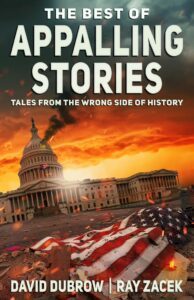 The new stories include Ray’s crime joint Wet City, which includes the unforgettable character Thugga T, and Happy Wife, Happy Life by me. I’d been working on and off on Happy Wife, Happy Life for some time; it was originally intended to be part of 2017’s Appalling Stories release under the title Bully, but I couldn’t come up with an ending that satisfied either me or the reader, so I scrapped it in favor of Cultural Overtones. It sat for years in a drawer before I could develop a conclusion to the thing, something that wrapped up the story while unsettling the reader, and in that I succeeded.
The new stories include Ray’s crime joint Wet City, which includes the unforgettable character Thugga T, and Happy Wife, Happy Life by me. I’d been working on and off on Happy Wife, Happy Life for some time; it was originally intended to be part of 2017’s Appalling Stories release under the title Bully, but I couldn’t come up with an ending that satisfied either me or the reader, so I scrapped it in favor of Cultural Overtones. It sat for years in a drawer before I could develop a conclusion to the thing, something that wrapped up the story while unsettling the reader, and in that I succeeded.
Sometimes, what’s interesting about a Best Of collection is what isn’t included. I didn’t include the bee stories, of which there are three, because some day I’d like to fold them into a short novel. If you’ve read The Bitterness of Honey, Dear Dad from the now-defunct CinderQ literary magazine, or My Lai, you know how strange they are; they should be (bee) together in some lengthier format. So they were out. Cultural Overtones, while it said what I wanted it to say, never seemed to grab anybody; the concept was there, the story worked, but for whatever reason it wasn’t a notable work. Ray originally wanted to leave out his The Orishas, but I persuaded him otherwise because it’s such a good, fun story that sticks with you.
We had to include my Deprogram and Ray’s Obsolete Man, because they remain topical years later. The majority of the blurbs we got for the entire series describe how the stories are prophetic, which is true on a certain level: we took cultural trends and extended them to their logical conclusions. Our driving intent, however, was to entertain readers by turning the people you’re not supposed to make fun of into antagonists. If there’s a protected class, we wanted to skewer it, and we did.
The one story I waffled on including was my Bake Me a Cake: it either turns you off the book completely or has you snickering. It was originally the first story in the first volume of the Appalling Stories series, and set the tone for the book being aggressively anti-PC. As broad satire, the point was to be on-the-nose and in-your-face. It’s the “go big or go home” of Appalling Stories, and I’m still proud of it. So it’s in. It’s supposed to disgust you.
Whether you find the themes troubling or not, The Best of Appalling Stories is an entertaining foray into the current cultural moment. I think you’ll enjoy it.






December 28, 2020
2020: The Year That Wasn’t
 How do you sum up a year spent in limbo?
How do you sum up a year spent in limbo?
We did a lot of waiting. At first we locked everything down and waited in our homes for two weeks to “flatten the curve,” give our beleaguered TikTok nurses a break. That didn’t work, so we waited longer. Don’t go outside. Kids can’t use the playground, let alone attend school. And yet the curve didn’t swell enough for us to flatten. Some of us poked our heads out. With masks on, of course. If you’re not wearing a mask you could literally murder someone. Your value as a human being is measured in how enthusiastically and frequently you cover your countenance. We fucking love science.
You’ve heard it all before.
In mid-December I withdrew the entire Appalling Stories series from circulation for a host of reasons, none of which involve any drama. In 2021 I’ll reissue certain stories in a Best Of omnibus. There’s some work there I’m proud of. Some of it’s funny, some of it’s disturbing.
I don’t own a small business that the lockdowns have closed, so any complaints I have involve my relative luxury not being luxurious enough. If you’re concerned about the state of the culture, you’re full, warm, and sheltered. Too many of us have slipped down a notch or two on Maslow’s hierarchy because of our reaction to the pandemic. I can’t help but think about them, and it’s shameful to bitch about the rest of it.
And yet, and yet, and yet. When your biggest fears are allayed, the smaller ones grow to take their place. So damn you, Hollywood, and damn the election shenanigans, and who’s going to hold the Chinese accountable for their appalling treatment of the Uighurs if we don’t? Save it. Save. It.
I didn’t write while my son was doing virtual learning from March through June. Kept him on task. Read, read, read. Reading is fundamental, you know, and if the writer’s kid hates reading it’s kind of a gigantic fail for me, so keep reading. During “recess” we drove to closed playgrounds and threw the frisbee around. School ended and he got all A’s. For staring at a screen. When he went to summer camp I got back to writing. Then school started: brick-and-mortar school. With masks on. Oh well. A week into the new school year I found that I’d written myself so deeply into a corner in the new series that I couldn’t find a way out. I spent weeks wrestling with it. One and a quarter books in, I had to conclude that the series was fundamentally hosed: none of the pieces fit together. So I put it in a drawer, this thing with superheroes and nanotechnology and ancient aliens, and moved on to something else. Space opera. Finally, progress: notes, character outlines, a story outline. Words on a page.
I didn’t watch a lick of TV for months, but got back into it: Korean dramas. My favorite this year was Misaeng. So good I made the wife watch it. She binged it like heroin. Korean dramas lack American cynicism and American preachiness, and they unabashedly manipulate you. Who cares? The storytelling satisfies. You can deconstruct it easily, and you find that the basics, done right, always work. They don’t subvert expectations: they give you what you want. Other series weren’t so good, like Rugal. Hated it, but the sunk cost fallacy gripped me in its fist. I was able to punch out of Bad Guys for similar reasons: dumb, unwatchable. Chief of Staff, both seasons, was very good. Same with The Good Detective. Strangers from Hell wasn’t bad.
Went on some classic reading tears to fill up my brain with good words. Reread Carson McCullers’ The Heart is a Lonely Hunter, and then ate up all of Flannery O’Connor’s fiction, both short and long form. O’Connor wasn’t a great novelist, but as a short story writer she could not be beat. Unforgettable stuff. John O’Hara is another great one, though I stuck to his novels rather than his innumerable short stories. Then to John Steinbeck, because why not? Now I’m back to John Updike, whom I haven’t read since my early 20’s. John, John, John. Go figure.
Read/study more, write less: my new cri de coeur. So I don’t update this blog terribly often. If I give away my words for free all the time, why should you buy them?
That was my 2020. There are many people for whom this was a great year, and you know who they are.
2021 will be better if we make it that way. Take care, and God bless.






October 9, 2020
The Invisibility of the Conservative Artist
 The panjandrums of the online right often bleat that conservatives complain about the culture but don’t do anything about it.
The panjandrums of the online right often bleat that conservatives complain about the culture but don’t do anything about it.
This is true insofar as you look at the issue from their perspective. It’s not objectively true, as I proved with the Appalling Stories anthology series: there I worked with several right-leaning writers to publish short stories intended to appeal to normal people. And at least a few other publishers focus on fiction written by conservatives, mostly in the science fiction genre. So there are, in fact, many conservative content creators. They’re just not successful enough to earn notice from conservative media’s bright bulbs, such as they are.
The reasons for this lack of success are manifold, but the two most important are the lack of quality among conservative writers and the isolation of the political right.
This lack of quality is evident in the overwhelming majority of fiction being published today, either filtered through the Big 5 publishing gatekeepers or unfiltered through Amazon’s distribution network. Most people, especially those calling themselves writers, can’t write well. This isn’t a problem specific to the political right, but it is a major contributor to conservative failure in publishing. The self-publishing explosion has eliminated all barriers to putting one’s work out there, but when one’s work is substandard, it falls to the reader to determine good from bad. Readers will buy a book if it has a great cover, attractive ad copy, and a genre they’re interested in reading. Because most writers can’t afford to buy great covers, let alone write good copy, their books fail. Most of the time this failure is deserved, despite that readers don’t know the difference between good and bad writing. They like what they like, whether it’s Fifty Shades of Grey or The Great Gatsby. If you want to appeal to right-leaning customers with any chance of success, you have to write books about space marines or post-apocalyptic survivalists. Anything else is all but doomed to fail; the conservative fiction market is just that tiny.
More to the point, most books published within the last ten years suck out loud. Particularly self-published books. Including those written by conservatives.
Isolation is the other major factor to conservative invisibility in the culture. The American left has successfully branded itself as the way things just are, so their messaging doesn’t include politically freighted language that the average reader will recognize. Conservatives often brand their material with terms like “liberty,” which turns off readers who just want to be entertained, not preached to. Conservatives also make the mistake of trying to appeal to a conservative audience, a group that automatically looks askance at material designed to appeal to them. As a writer, you want to appeal to everyone interested in your genre, not just a subgroup of like-minded individuals on social media who will click a heart button but not a Buy button. Secluding yourself on a tiny conservative island with other tiny conservatives won’t get you eyeballs, and it definitely won’t get you sales. When non-conservative fiction writers find out that you’re right-leaning, they’ll ostracize you at worst and deliberately ignore you at best.
But you’re a conservative/libertarian/conservatarian (ugh), so you should get help from right-wing media, right? Yeah, no. Conservative luminaries (the Twitter-addicted commentators on sites like Townhall, PJ Media, and The Daily Wire, for example) ignore conservative content creators for several reasons.
First, they’re paid to ignore you. They’d tweet less if they were paid to solve problems instead of complain about them. That’s why you see so many of the same columns written in the same places by the same people over and over and over again. Doers do, writers write. Conservative writers are not doers. Maybe some were once, but they’re not now. The problems they’re writing about exist as long as they’re paid to complain about them. So asking them to acknowledge that there are indeed conservatives creating culture is, in effect, asking them to deny their own revenue stream. Those who are being paid to write, that is. Many aren’t. When it comes to quality, you can’t tell the difference between paid and unpaid writers on the vast majority of these sites: they’re equally leaden and uninspiring. Same with the podcasters.
Another reason why they won’t acknowledge you is status. If you’re an unknown asking for a hand up, it means you’re a lower-status person, and they simply won’t risk their higher status to help you. Why should they? If you were any good, you’d be a higher-status person like them. That so many of them have achieved their status through successful networking rather than quality of work is something they can’t afford to think about; Impostor Syndrome is rampant in the media industry, and to look at oneself too closely in the mirror risks fracturing a deservedly fragile self-image. Between that and the standard in-group/out-group behavior, there’s no upside to acknowledging your existence. You’re not in the clique.
They’ll link each other’s dreadful, boring, banal pieces all day long, because that’s how they maintain status within their network, but you just don’t rate. Deal.
Yes, your (ostensibly) shared ideology suggests that they should help you out. Their bleats about the lack of conservative culture while you’re right here drawing comics and writing books are frustrating to hear.
The good news is that you don’t need them. Not even a little bit. The podcasters, columnists, and professional tweeters, no matter how famous they are in the tiny subgroup that is online conservatism, are not going to make or break your career. Only you can do that. Your lack of success isn’t their fault, and they can’t make you succeed, even if they were inclined to. So stop asking.
What you need to do is create less, read/sketch more, and eventually produce quality material that people will talk about regardless of political affiliation. Save your money until you can afford a cover that will catch the reader’s eye. Model success; don’t just ask for it, and model successful writers in your genre, not dime-a-dozen columnists. There’s a reason why their work is free to read on Twitter/Townhall, and your work costs money.
Unless you’re writing a conservative column, don’t ask conservative columnists for help getting eyeballs on your work. It’s like trying to market ketchup to people who like barbecue sauce. Even though some of these columnists write fiction themselves. Have you read it? I tried. It’s terrible, particularly the apparently popular stuff with plenty of Amazon reviews. You’re probably better than that. A tiny minority of writers can do both fiction and non-fiction well, like Michael Walsh. You’re not him. The other columnists aren’t him, either. Yes, you want to be popular. Yes, you want the big royalty checks. Your favorite conservative luminary won’t get you those things, even though he says conservatives should do exactly what you’re trying to do.
Online columnists are storytellers, too, but the difference is that they don’t do nearly as much work as you do in bringing a piece to market, and it shows in the final product. The story outline is written for them by the New York Times, New York Post, and Fox News: all they have to do is put an angry gloss on it. The audience, fattened on free content, is entirely undiscerning as long as the meat is red. The marketing is done through Tweets. There’s really nothing special about the work, intellect, or personality of the people you’re angry at for not helping you sell your book.
Eschew them and go elsewhere.






October 5, 2020
A Few Thoughts About the Business of Writing
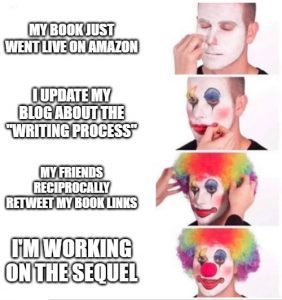 Selling books is nothing like you expect it to be. This is not to say that it’s harder than other vocations, though it is difficult. It’s that in the world of 21st century publishing, you have to work at things that you became a writer to avoid: chiefly, sales and marketing. Nobody who writes anything except books on salesmanship says, I spent hundreds of hours writing and editing and polishing and sweating and bleeding over this book; I can’t wait to get out there and grind, day after day, trying to sell it.
Selling books is nothing like you expect it to be. This is not to say that it’s harder than other vocations, though it is difficult. It’s that in the world of 21st century publishing, you have to work at things that you became a writer to avoid: chiefly, sales and marketing. Nobody who writes anything except books on salesmanship says, I spent hundreds of hours writing and editing and polishing and sweating and bleeding over this book; I can’t wait to get out there and grind, day after day, trying to sell it.
Most of us think that sales and marketing mean posting about your book on social media. Nothing could be further from the truth. Facebook and Twitter do not sell books. Even if you buy ads. Social media helps drive traffic to free content, but it does not sell your book. Asking your friends and family to spread your Amazon product link doesn’t sell books, either, even if you’ve got a big family. Email bookselling services like BookBub and Ereader News Today are costly to use, and you’re lucky if you sell enough through them to make it worth the expense. There’s definitely a helpful ego boost when you’re successful using them (however you measure success), so they’re not to be entirely despised. Psychic income means a lot when you spend so much time alone with your imaginary friends. Just know what you’re getting into.
There are no guaranteed sales methods: there are only gambits that may work for you. If you’ve got a good cover, good advertising copy, and a good concept, those help. Except when they don’t. Writing more books helps. Sometimes. Getting more successful writers to blurb your book might help. The amount of luck involved is more a factor than anyone wants to admit. Everyone in the Western world is writing and publishing books through Amazon. With all that competition, how do you succeed? How do you turn an expensive hobby into a money-making venture?
The good news is that you don’t have to write well to make a profit. Many terrible books sell. So quality (or lack of it) is no barrier to success. It does help to have a great cover. Readers know the difference between a great cover, a good cover, and a mediocre cover. The overwhelming majority of book covers are mediocre at best, even the ones you paid good money for. Even the ones I paid good money for. People do judge a book by its cover. When we had a good quarter, the CFO of the publisher I worked for would cynically joke, “Good job, art department.” It used to bother me. It doesn’t anymore. Readers are more likely to buy a book with a great cover and unlikely to buy a book with a mediocre cover. Player/game: you know which one to hate.
So we know what doesn’t work, we know what might work, and we know what helps. If you’re going to spend money on your book, focus first on cover (don’t do it yourself). Then advertising copy (don’t do it yourself). Then genre/concept/story (that’s all on you). Everything else is so far outside the bounds of consideration that it’s not worth thinking about, including editing. Oh, you should have the book professionally proofread and laid out, but nobody notices these things unless they’re poorly done. And if readers really like the book, they’ll ignore them.
It’s nice to be part of writing groups, because they help motivate you to keep writing. If you’re writing for the ego boost, join some groups and they’ll Retweet your Amazon link. Dopamine’s a good drug. Some of your fellow writers will give you writing tips. Even personalized writing tips. If you’re smart, you’ll ignore these tips, unless they’re offered by writers who are as successful as you want to be. Don’t take advice from people who haven’t succeeded. If they knew what they were talking about, they’d be doing it already. Including me.
Most writers don’t write well. They don’t read good books themselves, they don’t model success properly, and/or they just can’t produce anything but leaden, lifeless prose. This probably includes you. And me. It doesn’t matter: readers can’t tell the difference between good and bad writing. Look at the Amazon bestseller list in any genre for proof. There’s nothing wrong with that: people like what they like. Separating book sales from book quality is something few writers want to do, emotionally speaking. If it sells, it’s automatically good, right? Don’t burst the bubble.
Finally, don’t do what you see everyone else doing, particularly if they’re not terribly successful doing it. Giveaways, $.99 sales, bundling your book with like books, and review trades do not bring in respectable money. If you define success as selling three books a month instead of one, go for it. If your definition of success is more ambitious, save your money to buy that great cover. Hire a great copywriter. And acquire your comfort substance of choice if these things don’t work out. Paying a utility bill or monthly mortgage with book royalties is real money, and it’s why I don’t badmouth writers who can do it, even if their books are unreadable.
You have to be lucky. You have to write more books. You have to keep after it.
Otherwise, take your boring, poorly-written trash off the digital shelves and void the field for serious writers. You’re the horse crap that obscures the occasional pony.






August 28, 2020
Update 8-28-2020
When I’m not writing and rewriting, I’m planning and outlining. When I’m doing none of those things, I’m glowering at nothing, willing the words to come. They rarely obey. So, things are more or less normal.
—
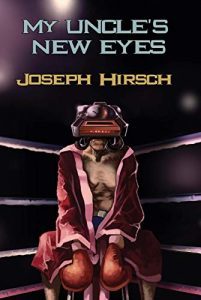 I’ve talked about author Joseph Hirsch in this space before, with my reviews of his disturbing science fiction novel Touch No One and his crime novel My Tired Shadow. He also contributed to Adam Howe’s anthology Wrestle Maniacs with a sort-of prequel story to My Tired Shadow. He’s really quite a prolific writer, so don’t take this as an exhaustive listing, and he dabbles in everything from horror to drama to even romance. I envy his skills and output.
I’ve talked about author Joseph Hirsch in this space before, with my reviews of his disturbing science fiction novel Touch No One and his crime novel My Tired Shadow. He also contributed to Adam Howe’s anthology Wrestle Maniacs with a sort-of prequel story to My Tired Shadow. He’s really quite a prolific writer, so don’t take this as an exhaustive listing, and he dabbles in everything from horror to drama to even romance. I envy his skills and output.
A more recent title of his is the sci-fi novella My Uncle’s New Eyes. It’s a taut, slow-burn thriller that keeps you seared to the page, and by the time you’ve read the last word, stick a fork in you: you’re done. A tale of lost memory, bizarre science, and shocking betrayal, it follows troubled teenager Michael when he’s sent to spend time with his uncle Jimmy “Grim Reaper” Reeves, a former boxer living in the desert with a beautiful, mysterious caretaker. Hirsch has a way of getting under your skin, making you feel everything his characters experience, and My Uncle’s New Eyes shows what a supremely skilled writer can do at the top of his game.
—
Season 3 of Dark, the German sci-fi show I talked a bit about here, wraps up the series in a way that’s minimally satisfying. SPOILERS FOLLOW. The Schrodinger’s Cat concept introduced in this season didn’t add anything valuable to the mythology, and the Origin Trio were too obviously shoehorned in as last-minute antagonists. Clausen’s subplot went nowhere. Eva cutting Martha’s face was silly and unnecessary. Noah, a child murderer, made a terrible hero. Where everything fell down for me was the end, which reflects the problem with most of today’s science fiction. There was nothing aspirational about it; the only way to fix things was for the characters to annihilate themselves. In a universe without God or an objective moral standard, all you have left is the amoral nihilism of pure science. Also, it was funny that they had to limit Mikkel’s appearance, due to the actor’s having grown ten inches between seasons. Kids.
 One show I can wholeheartedly recommend is the Israeli series Shtisel, about a Haredi (ultra-orthodox Jewish) family in Jerusalem. It does a good job of swimming in the dramedy realm, where the laughs are balanced by touching moments. Michael Aloni as Akiva makes you completely forget about his less sympathetic role as Himmler in When Heroes Fly. If I had a complaint, it’s that the show occasionally meanders in a less focused way, but with so many characters, it can’t be helped.
One show I can wholeheartedly recommend is the Israeli series Shtisel, about a Haredi (ultra-orthodox Jewish) family in Jerusalem. It does a good job of swimming in the dramedy realm, where the laughs are balanced by touching moments. Michael Aloni as Akiva makes you completely forget about his less sympathetic role as Himmler in When Heroes Fly. If I had a complaint, it’s that the show occasionally meanders in a less focused way, but with so many characters, it can’t be helped.
—
I’ve also done some writing for Romans One.
In this piece, I discussed despair:
Despair is where the Adversary lives. God, who is all good all the time, has a specific plan for you, and when you embrace despair, you deny God’s presence in your life. Despair represents the loss of faith, the false notion that you’re not equal to God’s plan for you. Obviously when something truly terrible happens like the loss of a spouse, parent, or child, despair is an easy pit to fall into. In the aftermath of a horrible assault, despair can seem like the only option. Despair is soul-crushing, and when you’ve truly experienced it, you remember that feeling for the rest of your life.
I also addressed the bromide of tolerance, arguing for less of it:
Too often, though, the reality is many college kids, fattened on a diet of Captain Planet as children, Howard Zinn as a teen, and Cornel West as a legal adult, are now working on a new college degree: screaming obscenities into a black cop’s face during a race riot. They think that’ll look good on a resume, and, sadly, in some quarters it just might.
Rather than pushing back early on, parents let it go. Rather than deciding enough was enough at the very beginning, they find themselves here.
And I offered the heretical notion that politics won’t save us:
If you want to change what’s going on instead of merely watching it, you have to focus on culture: art, media, education. This means doing more work on top of your 9 to 5. If you don’t like statue toppling, church defacing, and drugstore looting, you need to run for your local school board and win. You have to become a teacher who refuses to propagandize her students. You have to make movies. You have to write books. You have to paint pictures and put on plays and make music that elevates the values you hold dear.
—
I won’t sign off with “Stay safe,” because safety is overrated, and nothing important or good happens without some risk. Instead, I hope that whoever you are and whatever your circumstances, you’re having a great time and are with people you love.









